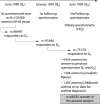Fruit and vegetable intakes and asthma in the E3N study
- PMID: 16396945
- PMCID: PMC1974844
- DOI: 10.1136/thx.2004.039123
Fruit and vegetable intakes and asthma in the E3N study
Abstract
Background: A study was undertaken to investigate whether dietary intake predicted the prevalence of adult asthma among French women participating in the E3N study.
Methods: Of 68 535 women who completed a food frequency questionnaire in 1993 which included 238 food items, 2145 (3.1%) reported having asthma. The distribution of food intake was divided into quartiles (Q(1)-Q(4)) and the prevalence of asthma was compared between the different quartiles (lowest as reference) using logistic regression models on cross sectional data.
Results: After adjusting for age, body mass index, menopausal status, smoking status, total caloric intake, physical activity, and use of dietary supplements, women who had a greater intake of tomatoes (OR(Q1-Q4) 0.85 95% CI 0.75 to 0.96, test for trend p = 0.02), carrots (OR(Q1-Q4) 0.81 95% CI 0.72 to 0.92, test for trend p = 0.0003), and leafy vegetables (OR(Q1-Q4) 0.82 95% CI 0.73 to 0.93, test for trend p = 0.0009) had a lower prevalence of asthma. Apples were marginally related to the prevalence of asthma. No other fruits or vegetables were significantly associated with asthma prevalence.
Conclusions: These results suggest that the intake of some vegetables may decrease the prevalence of adult asthma.
Conflict of interest statement
Competing interests: none declared.
References
-
- Romieu I, Trenga C. Diet and obstructive lung diseases. Epidemiol Rev 200123268–287. - PubMed
-
- Heffner J E, Repine J E. Pulmonary strategies of antioxidant defense. Am Rev Respir Dis 1989140531–554. - PubMed
-
- Repine J E, Bast A, Lankhorst I. Oxidative stress in chronic obstructive pulmonary disease. Oxidative Stress Study Group. Am J Respir Crit Care Med 1997156341–357. - PubMed
-
- Kelly Y, Sacker A, Marmot M. Nutrition and respiratory health in adults: findings from the health survey for Scotland. Eur Respir J 200321664–671. - PubMed

